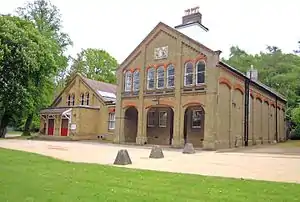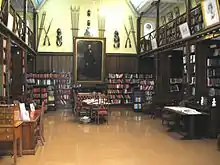| Prince Consort's Library | |
|---|---|
 The Prince Consort's Library in 2014 | |
| 51°15′17″N 0°46′21″W / 51.2546°N 0.7724°W | |
| Location | Knollys Road, Aldershot Garrison, Hampshire, United Kingdom |
| Type | Special library |
| Scope | Military |
| Established | 1860 |
| Access and use | |
| Access requirements | Open to military personnel |
Building details | |
| General information | |
| Construction started | September 1859 |
| Opened | September 1860 |
| Design and construction | |
| Architect(s) | Francis Fowke |
The Prince Consort's Library in Aldershot Military Town in the English county of Hampshire was founded by Prince Albert to contribute to the education of soldiers in the British Army. Today it is the military specialist library of the Army Library Service, specialising in the provision of information on current military topics, political subjects and international relations in support of operations, intelligence, training and education in the Armed Forces. It is a Grade II listed building.[1]
History


On 1 June 1859 Colonel Phipps wrote on behalf of Prince Albert to Major-General J. Peel, the Secretary of State for War, stating that the Prince Consort was 'desirous of presenting a collection of 1,000 books to the officers at the Camp at Aldershot', adding that the Prince would also provide the library to house the books.[2]
After further correspondence, work began on building the Library in September 1859, and it opened in September 1860 with 1,000 books which were donated from the collection of Prince Albert.[3] The Prince also paid the cost of building the Library, its furnishings, maintenance, and for the planting of trees and shrubs. The total cost amounted to £4,183.3s and 4d.[4]
The day-to-day running costs of the Library were paid for by the Prince Consort until his death in 1861, when Queen Victoria made it known that she wished to continue the Royal interest in the Library and ordered that its maintenance was to be met from the Privy Purse.[5] She also paid the salary of the first official Librarian, Sergeant Charles Gilmore (1834–1914) of the 49th Regiment of Foot, who held the post from 1861 to 1891, and his pension on his retirement.[6]
By 1887 the Library still only held 2,160 books, so the Aldershot Military Society was founded on 23 December 1887, under the patronage of Queen Victoria, to pay for further books through the subscription paid by members of the Society, while the Privy Purse continued to pay for the Library's maintenance. This arrangement continued until 1935, when the War Office assumed responsibility for both providing books and maintaining the building.[7]
The Prince Consort's Library was designed by Captain Francis Fowke[8] of the Royal Engineers, who also designed the Royal Albert Hall. An additional wing was added in 1911 containing a Lecture Hall and Reading Room.[4]
References
- ↑ Historic England. "Prince Consort's Library (1092600)". National Heritage List for England. Retrieved 13 December 2019.
- ↑ The Royal Archives, Windsor Castle
- ↑ Catalogue of the Books, Maps and Plans in the Military Library of His Royal Highness the Prince Consort Aldershot. Published by Taylor and Francis, London (1860)
- 1 2 Mallinson, Allan (16 October 2010). "Consort's beloved military library opens to the public". The Times. Retrieved 13 December 2019.
- ↑ The Prince Consort's Library 1860 - 1960 Published by Gale and Polden, Aldershot (1960) pg 15
- ↑ Vickers, Paul H. A Gift So Graciously Bestowed: The History of the Prince Consort's Library, Aldershot Hampshire County Council (1993) pg 155
- ↑ The Prince Consort's Library 1860 - 1960 Published by Gale and Polden, Aldershot (1960)pg 17
- ↑ Fowke on the Royal Engineers website Archived 2006-08-10 at the Wayback Machine
Further reading
- Vickers, Paul H. (2010) A Gift So Graciously Bestowed: The History of the Prince Consort's Library, Aldershot Friends of the Aldershot Military Museum; 2nd Revised edition ISBN 978-0-9566484-0-2
External links
- For the Army Library and Information Service site
- Prince Consort's Library and Cavalry Pediment Sculpture at the Rushmoor Borough Council site
- Biography of Fowke on the Royal Engineers website